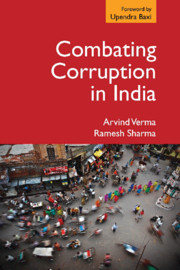Book contents
7 - Empowering and Professionalizing Anti-Corruption Agencies
from Part III - Way Forward: Alternate Solutions
Published online by Cambridge University Press: 13 November 2018
Summary
In this chapter, we will examine various proposals to augment the existing anti-corruption measures in the country. There are a variety of recommendations made by different committees and internal study groups to strengthen and professionalize the investigative agencies. The CBI Study Group Report provides many attractive suggestions that can assist the agency to be more effective and efficient. The same is true of state police agencies that handle the bulk of corruption cases. Evaluation of their training, resource mobilization and applications of technology suggest practical ways of enhancing the performance of these anti-corruption mechanisms. Additionally, many new legislative measures are needed to address the obstacles in effectively dealing with corruption.
Finally, participation of people at large as stakeholders need to be an essential factor in all functions of the officials. Furthermore, universal directives as per the UN Convention against Corruption, systems operational in Singapore, Hong Kong, Scandinavian countries and the RICCO provision in United States are also considered to develop a strong blue print of an anti-corruption strategy in the country.
Introduction
In 1962, the Santhanam Committee identified administrative delay, overburdened government, exercise of discretion in administrative judgments and cumbersome procedures as the four major causes of corruption in the country. The recommendations of the Committee led to the establishment of the CVC as an apex and independent body for prevention of corruption in central government units. In the Vineet Narain and others versus Union of India, the Supreme Court directed that statutory status be conferred upon the CVC. Following this judicial directive, the CVC Act of 2003 was promulgated for the constitution of a CVC to inquire into offenses alleged to have been committed under the PC Act, 1988. The Act also empowered the CVC to exercise superintendence over the CBI and to review the process of grant of sanction for prosecution against the guilty officers pending with competent authorities. An important process known as the Whistle Blowers Resolution was also adopted by the Commission to provide protection to whistle blowers from victimization and power to take action against complainants making vexatious complaints. A bill titled The Whistleblowers’ Protection Bill 2011 has been signed into law by the President on May 2014. The legislation aims to protect a person who exposes alleged wrongdoing in public offices, projects and functions.
- Type
- Chapter
- Information
- Combating Corruption in India , pp. 215 - 248Publisher: Cambridge University PressPrint publication year: 2018

